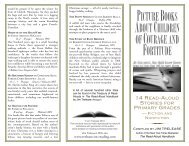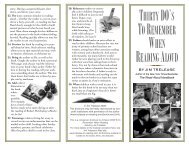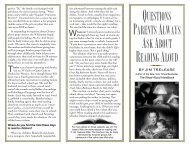Ten Facts Parents Should Know about Reading - Jim Trelease
Ten Facts Parents Should Know about Reading - Jim Trelease
Ten Facts Parents Should Know about Reading - Jim Trelease
You also want an ePaper? Increase the reach of your titles
YUMPU automatically turns print PDFs into web optimized ePapers that Google loves.
1. READING is the most important subject<br />
in school. Why? Because a child needs<br />
reading in order to master most of the other<br />
subjects. It’s extremely difficult to do word<br />
problems in math if you can’t read the<br />
words. How can you answer the questions<br />
in social studies or science if you can’t read<br />
and understand the textbook? If it’s so important,<br />
how does a child “get good at it”? Read<br />
on.<br />
2. ACROSS the world, children who read<br />
the most, read the best. And that includes<br />
all social levels—rich or poor, urban or<br />
suburban. Here’s a chart involving 250,000<br />
Literacy scores by income level and<br />
how often students engage with print<br />
teenagers in 32 countries. Starting with the<br />
left column (low engage.), we see students<br />
from Maecenas three income pulvinar levels who sagittis read the enim least,<br />
then those who read a moderate amount,<br />
and<br />
Lorem<br />
finally<br />
ipsum<br />
those<br />
dolor sit<br />
who<br />
amet,<br />
read<br />
ligula<br />
the<br />
suspendisse<br />
most (also<br />
nulla pretium, rhoncus tempor placerat fermen-<br />
the tum, widest enim integer variety ad volutpat. of print—books, Nisl rhoncus turpis magazines,<br />
est, vel elit, fiction, congue nonfiction). wisi enim nunc Among ultricies sit, all incomes,<br />
magna tincidunt. the more Maecenas they aliquam read at maecenas home, the<br />
higher ligula nostra, they scored, accumsan but taciti. the Lorem biggest ipsum gain dolor for<br />
low-income sit amet, ligula students suspendisse was nulla when pretium, they rhonentercus tempor placerat. Lorem ipsum dolor sit amet,<br />
ed<br />
ligula<br />
that<br />
suspendisse<br />
“most engaged”<br />
nulla pretium,<br />
category.<br />
Nisl rhoncus<br />
So how do<br />
we congue. get them to read more at home? Read on.<br />
3. WE humans are pleasure-seekers, doing<br />
things over and over if we like it. We go to<br />
favorite restaurants and order the food and<br />
beverages we like, not the stuff we hate. So<br />
if you want to ensure children visit “reading”<br />
more often, make sure they like it more<br />
than they hate it. How do we get them to like it<br />
that much? Read on.<br />
4. READ aloud to them, even as infants. Initially,<br />
the sound of your voice is a beacon of<br />
calmness, conditioning the child to associate<br />
you and the book with security. As the child<br />
grows, so too does the time you should<br />
spend reading in one sitting, from a few<br />
minutes to at least 20 minutes, from picture<br />
books to chapter books. I can see the benefits<br />
for younger children but I thought my 1st-grader<br />
was supposed to come home and read to me. How<br />
can he get better at reading if I’m doing the reading?<br />
Read the next paragraph.<br />
5. LISTENING comprehension comes before<br />
reading comprehension. You must hear a<br />
word before you can say it or read and write<br />
it. If you’ve never heard the word “enormous”<br />
in a meaningful way, you won’t understand<br />
it when it’s time to read or write it.<br />
There’s a kind of “word reservoir” in a<br />
child’s brain and one of the jobs of a parent<br />
is to pour so many words into it that it<br />
overflows into speech and then reading and<br />
writing. By age four, high-income children<br />
have heard 45 million words from their<br />
families and low-income children have<br />
heard just 13 million. That’s a 32 millionword<br />
difference equalling one year’s head-<br />
Childʼs total words heard by age 4<br />
—Meaningful Differences by Hart & Risley<br />
start for the advantaged child. HUGE<br />
FACTOR: a child spends 900 hours a year<br />
in school and 7,800 hours at home. Who’s<br />
the most important teacher? At what age do<br />
you stop reading to a child? Read on.<br />
6. CHILDREN usually read on one level<br />
and listen on a higher level. It’s usually not<br />
until eighth grade that the reading level<br />
catches up to the listening level. This means<br />
that first-graders can hear and understand<br />
third- and fourth-grade books they can’t<br />
read yet. These chapter books gradually<br />
introduce them to new words, new ideas,<br />
and the world beyond their neighborhood—and<br />
that, in turn, helps them better<br />
understand what they need to read in their<br />
school books. Simple sentences in Dr.<br />
Seuss books like “Hop on Pop” were written<br />
to be read by beginning readers to<br />
themselves; that’s why the cover label reads<br />
“I Can Read It All by Myself.” Six-yearolds<br />
are capable of understanding sentences<br />
that are longer and richer than “All<br />
Fall. Fall off the wall” but an adult must<br />
help by reading richer sentences like, “Mr.<br />
McGregor was on his hands and knees<br />
planting out cabbages, but he jumped up<br />
and ran after Peter, waving a rake and calling<br />
out, “Stop thief!” (The Tale of Peter<br />
Rabbit) What <strong>about</strong> families that can’t afford<br />
books? Read on.<br />
7. THE top winter Olympians come from<br />
states where they have the most ice and<br />
snow. And reading research shows that<br />
children who come from homes with the<br />
most print—books, magazines, and newspapers—have<br />
the highest reading scores.<br />
They also use the library more than those<br />
with lower scores. Libraries have the most<br />
and best books in the world—all for free.<br />
Remember: a used book for 50 cents—like





